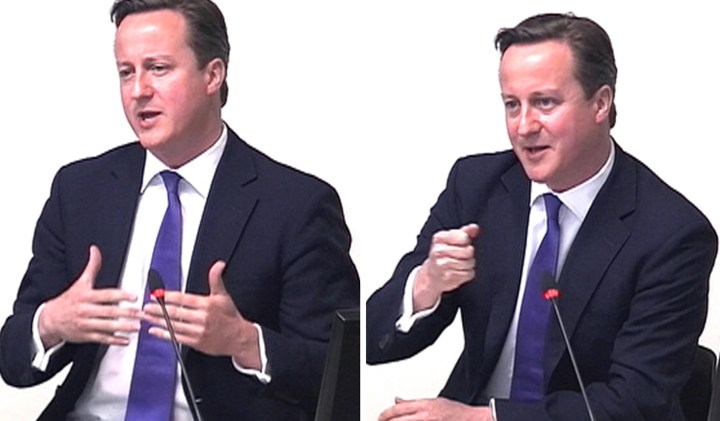World
Lies, more damned lies and Leveson

The never-ending Leveson Inquiry into media ethics in the UK has seen the likes of Tony Blair and David Cameron trotted out to give testimony. What a smarmy bunch they all seem now, and how astonishingly cosy they’ve all been with Rupert Murdoch, writes REBECCA DAVIS
As the Guardian pointed out this weekend, God will surely have his work cut out in the wake of the Leveson Inquiry. All witnesses testifying before Lord Justice Leveson are required to give the traditional courtroom oath, swearing by “Almighty God” to tell “the truth, the whole truth, and nothing but the truth”.
This is awkward, to say the least, given the epidemic of lies and evasion currently being heard by the court. Those who don’t just tell flat-out porky pies engage in elaborate verbal circumlocutions to avoid committing to the truth, citing dodgy memories or unreliable records.
This would all be pretty disturbing if the people giving evidence were just ordinary Joes hauled off Clapham High Street. But the fact that the people testifying are, instead, some of the most powerful figures in the Western world, makes the whole spectacle downright revolting, and grist to the mill of any hardened political sceptics. It’s enough to turn us all into anarchists.
First of all we had the perma-tanned Tony Blair generously taking time off from saving the Middle East to grace Leveson with his presence. Blair, prime minister from 1997 to 2007, was hardly in a position to claim that he and Rupert Murdoch are on chilly terms because of one rather incriminating factor: Blair is the godfather of Murdoch’s daughter, Grace, and attended her baptism on the banks of the River Jordan in 2010. Asked whether his relationship with Murdoch was inappropriately close, however, he claimed that he and Murdoch only really became close after he left the office of 10 Downing Street. In fact, he described his post-2007 relationship with Murdoch as “healthier”, which will come as a relief to all.
It’s particularly odd that Blair should end up so chummy with Murdoch because he was outspoken in his feelings about the British press during his time in office. Shortly before leaving office in 2007, he gave a speech in which he compared the media to a “feral beast, just tearing people and reputations to bits, but no one dares miss out”. Ah well, let he who hasn’t become godfather to the spawn of a feral beast cast judgement.
Of special interest to the inquiry was the fact that Tony Blair had three phone calls to Rupert Murdoch in the build-up to the Iraq War in 2003. Blair dismissed these as routine – “I would have been wanting to explain what we are doing,” he said. “I don’t think there’s anything particularly odd about that”.
He denied that he had been lobbying Murdoch for positive press coverage. (All Murdoch’s newspapers in the UK were staunchly pro-invasion.) Blair’s controversial war did come back to haunt him, however, when an anti-Iraq War protestor burst into the inquiry. The man – who was later identified as David Lawley-Wakelin from the Alternative Iraq Inquiry – was detained after yelling: “This man is a war criminal!” Blair was reportedly unruffled.
The previous week, Labour MP Tom Watson had sworn to Almighty God that Tony Blair had ordered that the enquiry into phone hacking at News International be called off after receiving a phone call from Rupert Murdoch in 2009. In his testimony, Tony Blair swore to Almighty God that there was “absolutely no truth” to this claim, so it’s basically a case of picking the politician you distrust least.
Probably Blair’s most absurd claim, however, was that his spin doctor Alastair Campbell never used to bully journalists. Campbell is nothing short of legendary for his bullying ways. It is well known that the character of Malcolm Tucker, from the BBC satirical series, The Thick of It, was based on Campbell, particularly in terms of his expletive-laden rants: “Please could you take this note, ram it up his hairy inbox and pin it to his fucking prostate,” Tucker yells to his assistant at one point in an episode in the first series.
So, to sum up history according to Blair, Campbell was meek as a kitten, Blair and Murdoch had a perfectly appropriate relationship and there was nothing at all weird about the British prime minister phoning up the head of a media empire three times directly before invading Iraq. Lord Justice Leveson seems to have enjoyed it all – so much, in fact, that he has asked Blair to help him with proposals on how to regulate the press, when all this is done and dusted.
Blair will no doubt be relishing the opportunity to exact revenge against, in particular, tabloids which he saw as carrying out a vendetta against his wife, Cherie.
This is all terribly interesting, however, because on Saturday the Guardian published the last instalment of its serialisation of Alastair Campbell’s diaries. And in it, Campbell says that the reason for Murdoch’s phone calls to Blair were to try to persuade Blair to get the hell on with invading Iraq. Campbell wrote on 11 May 2003: “[Blair] took a call from Murdoch who was pressing on timings, saying how News International would support us, etc. Both TB and I felt it was prompted by Washington, and another example of their over-crude diplomacy. Murdoch was pushing all the Republican buttons, how the longer we waited the harder it got.”
Campbell, under oath like everyone else, also told the Leveson Inquiry last month about this call. When Murdoch took the stand in April, however, the old Australian swore to Almighty God that “I’ve never asked a prime minister for anything”. He also said, after further questioning, “As for the three telephone calls with the then prime minister, Tony Blair, in 2003, I cannot recall what I discussed with him now, nine years later, or indeed even if I spoke with him at all.”
How frustrating it must be to be plagued with such an unreliable memory, especially over something as memorable as persuading a world leader to start a war.
Last week it was Blair’s successor, Gordon Brown, who had his moment in the sun at Leveson. There was always going to be one major question for Brown, and it followed again from Murdoch’s testimony to Leveson in April. Murdoch told the inquiry that he had spoken to Brown over the phone in 2009, after his tabloid The Sun had switched allegiance from the Labour party to the Conservatives (in Britain it is standard for newspapers to publicise their support for a political party). Murdoch said Brown had accused News International of declaring war against the Labour government, and that the Labour government would have no choice but to “make war” against Murdoch’s newspapers in response.
Well, unsurprisingly, Brown said this never happened. “There is no evidence of this call happening at the time he said this call happened,” Brown told the inquiry last week. “The call did not happen and the threat was not made.” Subsequently, the cabinet office corroborated this by announcing that it had no record of such a call, and that in the year of 2009, there was only one recorded phone call between Brown and Murdoch, on November 10, on the subject of Afghanistan.
Despite this, Murdoch is sticking to his guns. He tweeted: “I stand by every word I said at Leveson”. How odd, though, that he would have such detailed recall of his call to Brown in 2009, and no memory at all of a call to Blair two years previously.
Last but not least on the rogues’ roster at Leveson was current British Prime Minister David Cameron, who took the stand at the end of last week. The picture that emerged from Cameron’s testimony was that of an awfully close friendship with axed News International executive Rebekah Brooks. Cameron was at pains to underplay the intimacy of their engagement, saying merely that they texted each other once or twice a week. (We previously learned from Rebekah Brooks’s own testimony that Cameron liked to sign his texts LOL, believing it to stand for “lots of love” rather than “laugh out loud”.)
But Cameron was then made to squirm through the reading of a text message sent by Brooks to him on the eve of the Conservative conference in 2009. (The Leveson Inquiry obtained the backups of Brooks’s work BlackBerry through News International.) “I am so rooting for you tomorrow not just as proud friend but because professionally we’re definitely in this together!” read the SMS. “Speech of your life? Yes, he Cam!” Ignoring that excruciating last pun – which went on to be the headline in The Sun shortly afterwards – clearly the most damaging part of this lies in that clause stating that “professionally we’re definitely in this together”. What exactly did Brooks mean by this? It certainly reads stronger than merely a statement of a friend’s support.
But Cameron said it was nonsense to suggest that News International and Murdoch had any kind of inappropriate relationship. Gordon Brown had previously suggested that the Tories had an undercover deal with Murdoch where they would smooth the path for his business interests in exchange for flattering coverage in his newspapers. Not so, said Cameron: “Not only was there no covert deal, there was no overt deal, and there wasn’t ‘nods and winks’,” he said.
Which is interesting, again, because when Cameron had to decide who in his cabinet to appoint in order to decide whether Rupert Murdoch be allowed to take over broadcasting channel BSkyB, in December 2010, he appointed the culture secretary, Jeremy Hunt, who was on record as being highly supportive of Murdoch’s bid.
In fact, Hunt had sent Cameron a private note in November 2010 arguing in favour of Murdoch on this matter. But Cameron told Leveson that he “did not recall” the note. What is it about politicians and memory?
Trying to get to the truth through all this icky sludge seems like a deeply unenviable task. Though the end goal of the Leveson Inquiry is ostensibly to regulate the media, it may take some political carcasses along with it too. The portrait we are receiving of collusion between Murdoch and top politicians is perhaps unsurprising, but certainly a little chilling. More than this, however, the evidence we are now amassing points to the willingness of top politicians to lie under oath (though, you may argue, hardly surprising either). Surely it’s all enough to make the Brits consider moving to Africa. DM
Read more:
- Leveson queries Cameron’s decision to hire Hunt, in the Telegraph
- Rupert Murdoch pressured Tony Blair over Iraq, says Alastair Campbell, in the Guardian
Photo: A combination of still video images show Britain’s Prime Minister David Cameron as he gives evidence to the Leveson Inquiry at the High Court in London June 14, 2012. Rupert Murdoch’s UK newspaper chief told David Cameron the night before a crucial political speech in 2009 that they were “professionally in this together”, an inquiry revealed on Thursday, embarrassing the man who now rules Britain. (REUTERS/POOL via Reuters TV.)



















 Become an Insider
Become an Insider